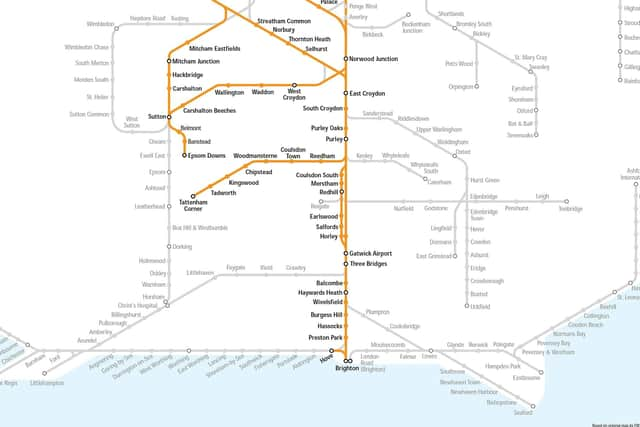Rail strikes: Sussex passengers warned not to travel next week unless journey is essential - update on Thursday, June 16
and live on Freeview channel 276
Tens of thousands of rail workers have decided to walk out on Tuesday June 21, Thursday June 23 and Saturday June 25 across Network Rail and 13 operating companies.
The RMT union says its members have faced multi-year pay freezes, while it suggests plans to cut thousands of jobs would make the country’s railways unsafe.
Advertisement
Hide AdAdvertisement
Hide AdSoutheastern is among the companies where strike action has been called, and while staff at Govia Thameslink Railway, which operates Southern and Thameslink, are not walking out, it depends on Network Rail to keep trains running.


GTR is advising passengers to only travel if their journey is essential.
On the strike days, only the Brighton Mainline will have services running (along with services to and from Hove), with the Arun Valley line and both East Coastway and West Coastway lines all closed.
GTR is also warning there will be very few trains every day from the start of the industrial action, on Tuesday June 21, until Sunday 26 June inclusive with crowding expected, particularly on last trains and possible delays.
Advertisement
Hide AdAdvertisement
Hide AdThere will be late starts and early finishes – as early as late afternoon – throughout the period.
GTR has been in touch with schools, colleges and hospitals to notify them of the impact of the strike action.
Although RMT members at GTR voted only for action short of a strike, the operator depends on Network Rail signallers and engineers to keep its trains moving, and its services connect with many lines and stations managed by other operators whose staff are taking action.
Angie Doll, GTR’s chief operating officer said: “Services will start much later than normal and finish early. All this may lead to very busy trains and possible delays. Passengers should plan ahead and think about travelling at another time.”
Advertisement
Hide AdAdvertisement
Hide AdMark Killick, Network Rail route director, added: “We’re so sorry for the disruption next week and we know how difficult this will be for our customers so soon after the pandemic.
"We’ve trained 250 staff so we can keep some of the busiest lines open, focusing our resources on the routes that can keep the largest numbers of customers and freight moving and serving vital locations such as hospitals.
"That said, we will not compromise on safety and the strike does mean that large parts of the network will be closed.”
There will be a skeleton service of around 25 per cent of normal on strike days (21, 23 and 25 June) with many lines closed altogether. There will also be a greatly reduced service based on an amended Sunday timetable (about 60 per cent of weekdays) each day following a strike (22, 24 and 26 June) due to the impact of the previous day. Crowding and delays are expected throughout.
Advertisement
Hide AdAdvertisement
Hide AdAs this industrial action is affecting the whole country, GTR will be unable to provide alternatives such as replacement buses and ticket acceptance with other local rail and bus operators.
Trains will start later and finish earlier – leaving and returning to depots 0715-1845 on strike days and 0715-c2300 each day after a strike. First and last train times will vary considerably along each route.